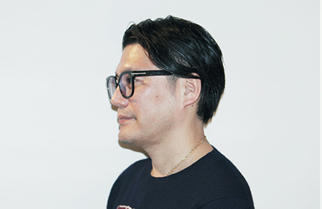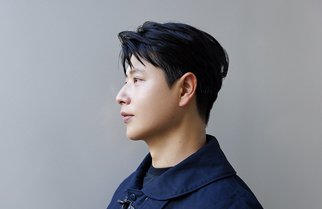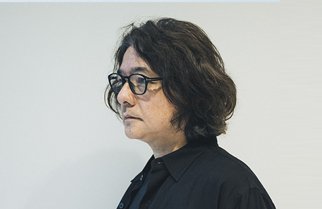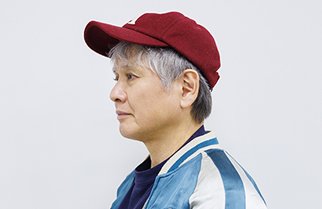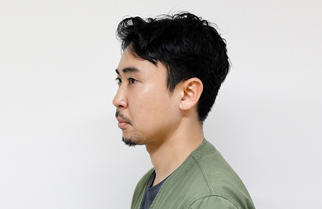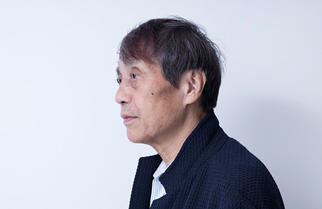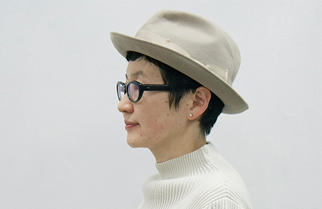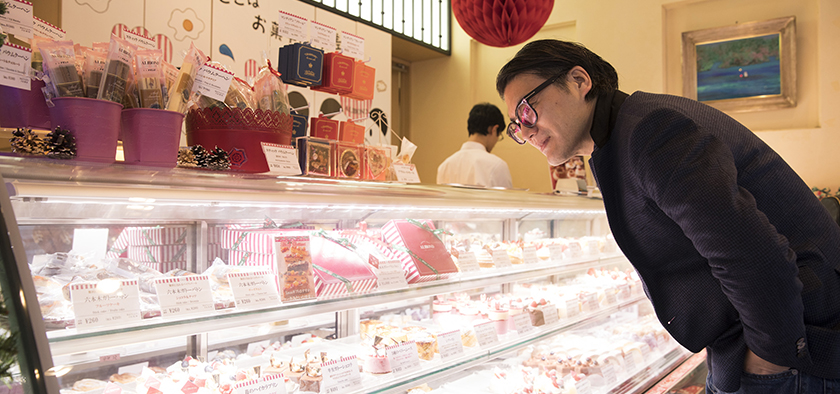
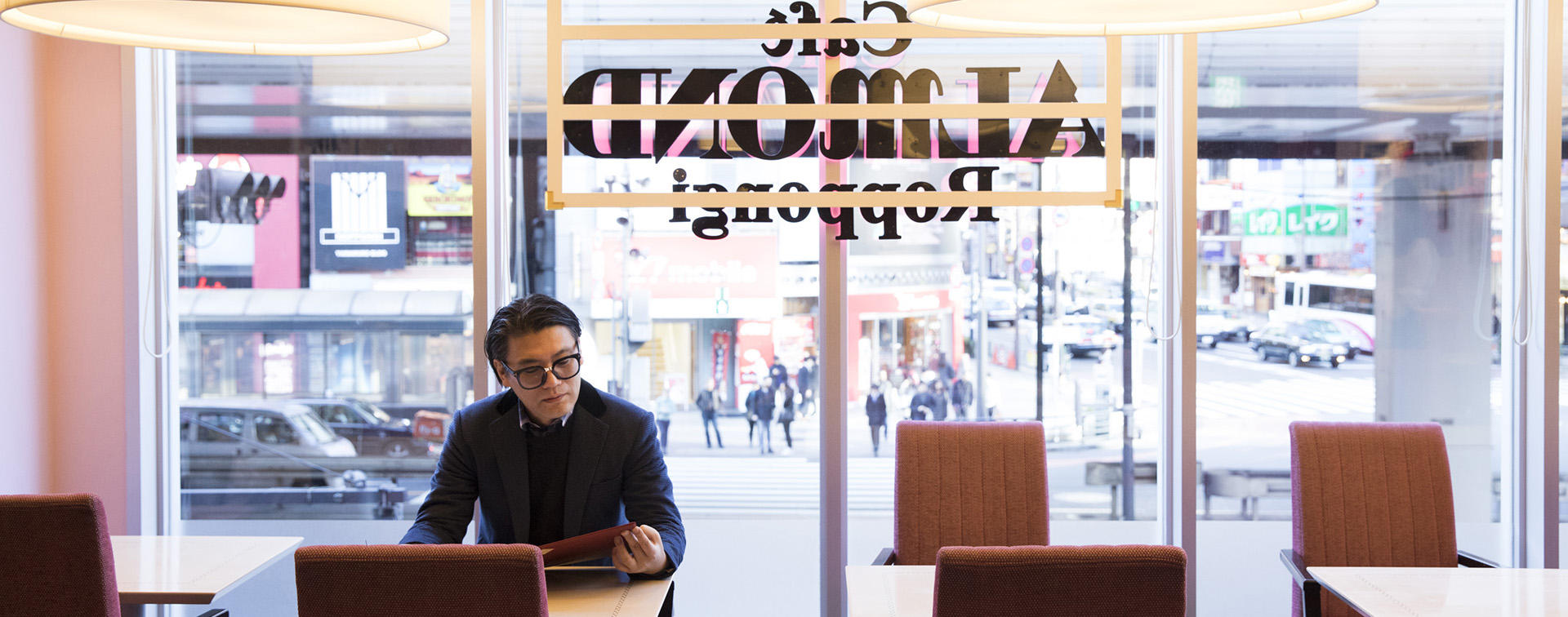
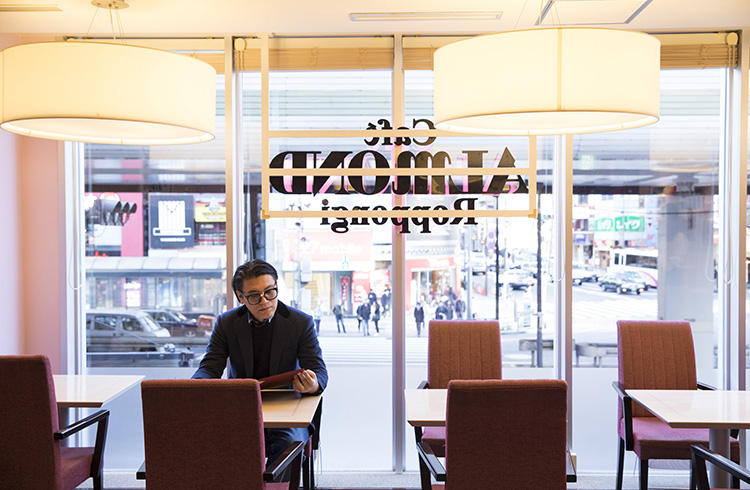
I hope adults in Roppongi will always let young people have fun
Creating an area that makes young people want to act grownup
Since launching a brand named after himself, fashion designer Keita Maruyama has been at the forefront of his profession for more than 20 years. Maruyama is from Shibuya, and he told us that while growing up, he learned many things visiting the neighboring area of Roppongi. We asked him about his memories of Roppongi and what he thinks can be done to make Roppongi an appealing place for the younger generation who will bear the future.
The uneasiness of talking about individuality
People talk a lot about individuality, but I don't know what the fuss about. Individuality just means that every person is different. Each one of us is made up of different cells, and everyone living is individualistic. Individualistic doesn't mean you have something prominent. Society is simply a gathering of individuals.
Out of the necessities of food, clothing and housing, perhaps we can express ourselves most easily through what we wear. But I don't agree with people who say, "Be individualist in fashion"; I don't have that concept at all. I think that it's individualistic to want to be yourself by wearing different clothes from other people and that it's just as individualistic to want to blend in with the crowd. Some people feel comfortable wearing uniforms, and of course, some people don't care about fashion. I think society is interesting because there are all kinds of people.
In Japan, it's considered a good thing to adjust yourself to a certain extent to other people. This notion itself is very individualistic; it's a pity that some people feel it's an inferior custom and can't take advantage of it. In short, the Japanese tend to think in stereotypes - they think that "individualistic" means certain things and they ought to be doing those things. Hiding your individuality is really an individualistic act, but the Japanese don't think that it is. The Japanese otaku culture is highly appreciated abroad by fans who think with awe, "We wouldn't be able come up with such ideas"; the otaku are regarded as being very individualistic. But for some reason, the Japanese think negatively of otaku, which is a pity. Anything that doesn't fit the stereotype of the ideal is not recognized.
Society is made up of people who fit the ideal image, and those who don't; in a country where this notion is prevalent, I'm sure people would find it uncomfortable talking about the subject of individuality. I wish that the way the Japanese people think will change. It's only natural that everyone is different, so there's no need to bother pursuing that. Basically, we should be free to be anything.
Acting grownup when visiting Roppongi
I was born in 1965 in Shibuya ward's Jingumae in Shibuya. I'm of the generation that adored the 70s Roppongi culture and the adult atmosphere of the streets. I began visiting Roppongi to have fun when I was in the first year of senior high school. It was in the early 80s and Roppongi was a place where I would try hard to act grownup. I admired the adults who gathered at Chianti. A little later, there was a big fad when girls wore long, one-length hairstyles and dressed in tight-fitting clothes. (laughs) I guess that young people now don't know about Square building. Roppongi in those days was filled with tremendous energy - I almost feel sorry for the people who haven't experienced that time. You would try to hail a taxi but the taxis wouldn't stop. Boys needed to own a car if they wanted to get the serious attention of the girls. Later on, the club culture shifted to Nishi-Azabu and then to Harajuku, but since it was my starting point, Roppongi for me, still seems like a place for adults - even though I'm very much an adult now.
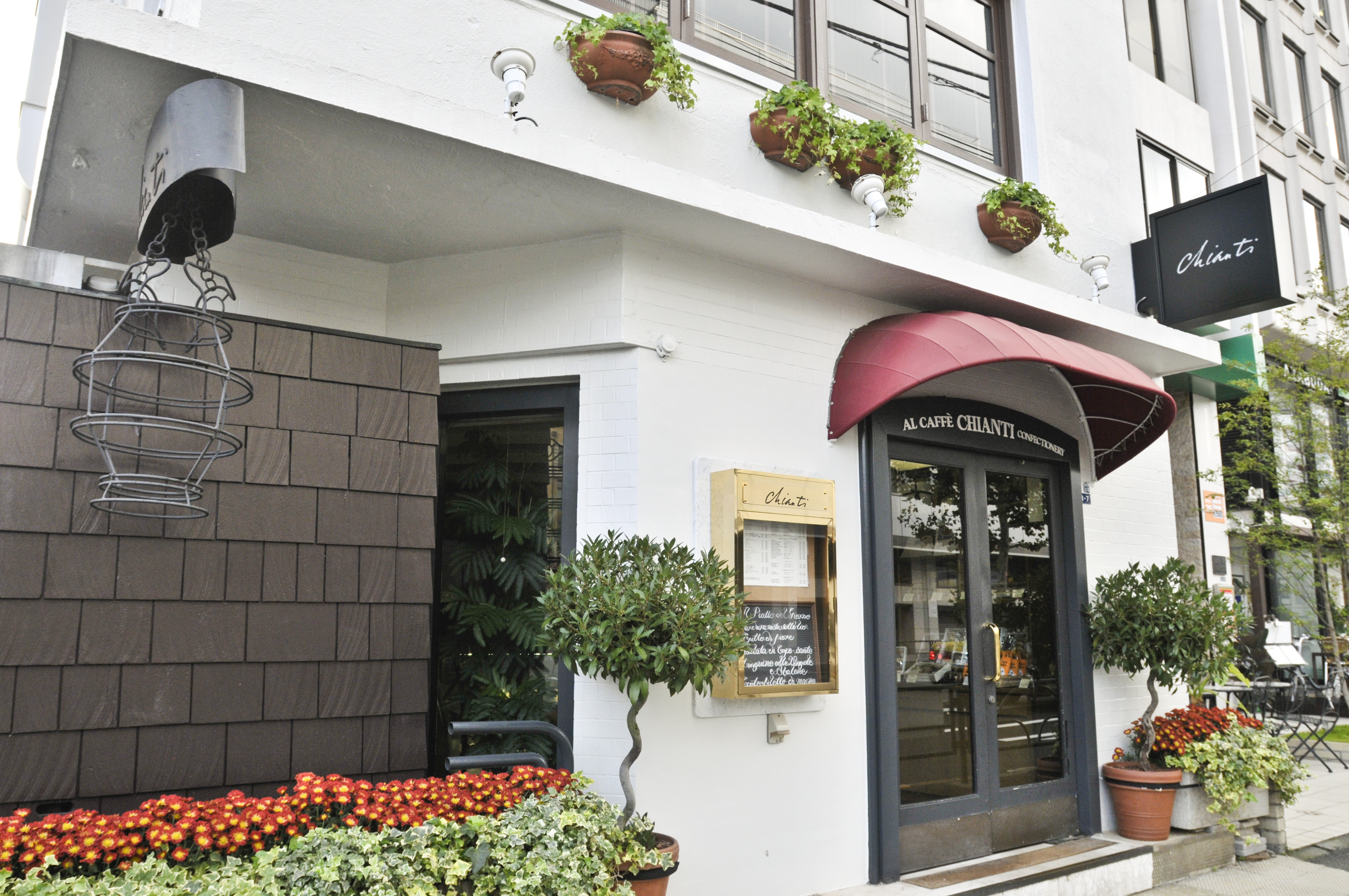
Chianti
An Italian restaurant that opened in 1960 in Azabudai 3 chome. The establishment had a relaxed and sophisticated atmosphere like that of a European salon which was rare in Japan at that time, and it drew many intellectuals, artists and celebrities. During the bubble era, the restaurant became a symbol of the glamourous life, and the word "Chianti-zoku" (Chianti-tribe) became popular.
Square Building
A 10-storey building with two basement floors which housed numerous discos, and which was a symbolic Roppongi landmark of the bubble era. Almost all of its floors were occupied by discos such as Nepenta, Giza, Xanadu, and Castel. It had a famous glass-paneled elevator. The building was demolished in 2007 and the site has become a car park.
While the building has unfortunately been renovated, Almond Roppongi is a place that symbolizes the era when I used to have fun in Roppongi. "Let's meet in front of AlmondRoppongi" was like a mantra in those days; an amazing number of people would gather here on weekend nights. Almond holds many memories for me going back to my childhood; I remember there used to be cream puffs called Paris-Brest (now called Ring Choux Classic).
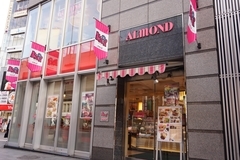
Almond Roppongi
A café and cake shop that opened near the Roppongi crossing in 1964. It temporarily closed due to the renovation of the building, and re-opened in the same place in December 2010.
In Roppongi, and in Tokyo as a whole, there are areas which have evolved and changed drastically and areas which have still somehow retained their downtown atmosphere; I think the co-existence of both kinds of areas is appealing. In Roppongi, there are still residential areas a little distance away from the main roads, and though they have become fewer, there are still some long-established confectioneries like Almond. Roppongi can almost be said to be a place where the Western culture started, and it's a cosmopolitan place.

The atmosphere of old times may be returning to Roppongi
I like walking alone in the streets at night. Sometimes, when I'm working late into the evening, I go outside and take a stroll from Aoyama to Roppongi, viewing the streets. During such walks, I feel that while Tokyo has its chaotic and speedy side, it also has a quiet and calming side. Maybe this is because I was born and raised in Tokyo, but I've seen other cities in the world, and it seems that this is an aspect that I can only feel in Tokyo. I feel it in Roppongi too - it's interesting how the area is completely different at nighttime from the daytime. During the day, there are so many workers, but at night, it becomes filled with partying people. I like that dual nature.
Like Harajuku and Asakusa, the name of Roppongi is known overseas, isn't it? When people think of Tokyo nightclubs, they think of Roppongi - even though that image might be of a decade ago. But these days, it seems to me that the nightlife atmosphere might be returning a little to Roppongi. I was recently eating at a kakigori (shaved ice dessert) shop in the middle of the night when a group of about 15 people who were apparently club-hopping, came into the shop. Foreigners made up about half of the group and about half of the girls seemed to be "kikokushijo" (children of expatriates); they were talking excitedly in a mixture of Japanese and English. One of the girls was wearing a one-shoulder top; the girls gave off a healthy aura which is unusual in Japanese girls these days. The boys were also animated. They all cheerfully ate kakigori and then left the shop to go to their next destination. Watching them, I thought, "Ah, it reminds me of old times!" (laughs) I felt happy to think that the effervescent atmosphere is coming back to Roppongi.
Encountering all kinds of things in towns
Even now, I feel my heart beat a little faster when I come to Roppongi. It's nice that the area as a whole has energy. The only bad thing - though this can be said about places other than Roppongi - is that there are many chain stores. When there are many chain stores, the cities of the world all begin to look the same and they become uninteresting. I suppose it's difficult to get rid of chain stores, so I wish they would at least change their façade a little and adapt to the area. People like going to focal places - places that are unique to the town and cannot be found elsewhere. When Hobson's opened in Nishi Azabu, I was amazed to see how people would wait in long lines to buy ice cream. Compared to those days, we live in times when information is so easily accessible.
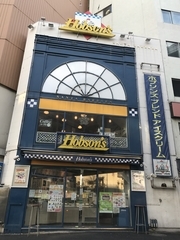
Hobson's.
An ice cream shop that was founded in Santa Barbara, California. Japan's first Hobson's store was opened in Nishi Azabu in 1985. During the bubble era, long lines would form even during the middle of the night, and it was a much-talked-about store. There are now other stores in Japan, mainly in Tokyo.
We now have convenient tools like Instagram, and people are increasingly going to places that are "Instagenic." It doesn't matter how you became interested in something. What matters is to have an experience - not just taking a photo and posting it. If you didn't have the information, you might never be walking in the streets and going to the shops, so it's very important to actually explore and experience and encounter all kinds of things. Towns are places that allow you to make encounters with so many different things, so you should enjoy yourself by being keeping your eyes open.
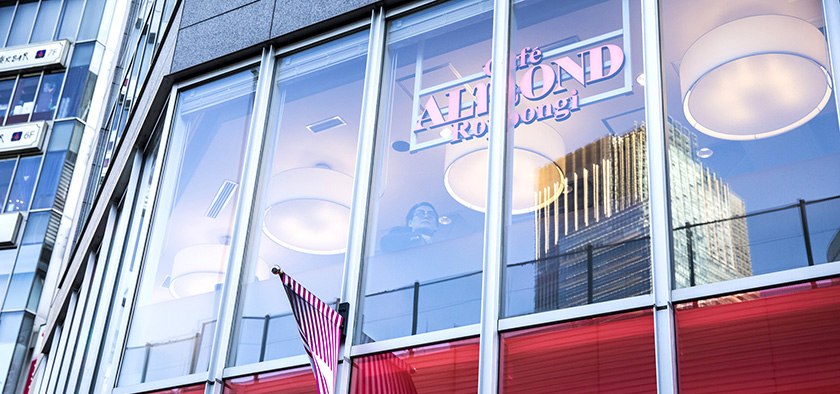
How to stop oneself from becoming an inflexible "ojisan"
At one time, the towns in Tokyo like Shibuya, Shinjuku and Ikebukuro all looked the same, but with the economic downturn, a lot of things have been weeded out, and the towns have regained their characters. In the main streets where the rents are high, there are still many chain stores, but in the alleyways, you will find that small, charming bistros have opened and that inside, there are quite a lot of foreigners. I was surprised that they know of such places, and when I asked how they found them, they said they looked at sites like TripAdvisor or learned by word of mouth. Recently, Tokyo seems to have become a mere passing point, and more foreigners are apparently going to interesting places in other regions. It's good that there the number of regions that foreigners find attractive is rising, but at the same time, I feel that not enough PR has been sent out on the appealing things that can be found only in Tokyo.

TripAdvisor
A website and mobile phone application providing reviews on hotels, restaurants, and sightseeing spots and which allows the viewer to make price comparisons on travel tips. The company operating the service, TripAdvisor, Inc., is headquartered in Newton, Massachusetts, U.S.A.
For instance, here we are eating cake at Almond, but if the French were to eat this, the texture would be probably be new to them. In France, you won't find these delicate cakes that have been rearranged for the Japanese. And the desserts sold in the convenience stores are of a considerably high standard too. There are many things like that in our everyday lives that should be rediscovered and recognized. Things that look ordinary but are remarkable can be called "fresh", and it is the fresh things that make a town a unique, so I wish people will value them more. "Ojisan" (middle-aged men) may have the decision-making powers in matters, but they don't wander out into the streets, so they don't have the eye to notice these things. On the other hand, "obasan" (middle-aged women) are always conscious of trends, and visiting all kinds of places. We need to leave the ojisan era behind. (laughs)
By ojisan, I don't mean to refer to a certain age or gender. There are many young people who have characteristics of ojisan, and there are women who have become like ojisan. Such people have led Japanese society, and as long as they wield power, change is not going to happen in Japan. People should stop trying to protect themselves and instead think about the future; unless we do that, we will not be able to make truly attractive cities.
To prevent yourself from becoming an ojisan, it's very important to keep your mind flexible. You don't need to embrace everything that is new and you don't need to reject everything that is old, but you should try to experience things and not make hasty judgements; when you decide you dislike something before you have tried it, your mind becomes rigid. If you eat something and you don't like it, that's O.K because it's a matter of preference. But if you make judgements about things before you have even tried them, then you are on your way to becoming an ojisan - so you need to be careful.
Showing young people the wonderfulness of real experience
When I was a teenager, Roppongi was a place where adults let me have fun. They showed me all kinds of things, taking me out to dine and have experiences. I really enjoyed it and was able to learn. The more I tried to act grownup, the kinder and more supportive the adults became. That's how society should be, isn't it? Though I must say it is a problem that my generation didn't continue the tradition. Nowadays, people have become childish, but I think adults need to create an environment where young people will want to act grownup to be treated as adults. We need to do that to change the course of our future.
There are times these days when I see people in their late teens or early twenties and feel that they exude the air of the era I experienced. Maybe it's because their parents went through the bubble era and they've inherited their DNA. (laughs) Young people today don't set up boundaries between Japan and the world; they have a sense that everyone is connected, and I find it interesting chatting with them. But because they feel this connection, they have an attitude of "Why bother going to places?" as if they don't see the value of real experience. So perhaps the role of adults is to show young people how marvelous it is to actually travel. And once they realize that, they will absorb things very quickly; I envy the way young people of today learn so much faster.
The upbeat young people in Shanghai
I recently went to Shanghai and was surprised in good and bad ways. Perhaps this is a misleading thing to say, but I was shocked to see that the vulnerable people in society are cast aside. In Japan, drastic technological steps are not swiftly implemented in everyday life due to consideration for the elderly: we don't want to cause them confusion. But in Shanghai - and maybe this is because it's a direct-controlled municipality - I got the impression that there is a national commitment to adopting the most advanced technology. For example, when I went to Shanghai Disneyland Park, I found that unless I downloaded the app, I couldn't make Fastpass reservations. And when I went shopping in town, it was impossible to shop without Alipay or WeChat Pay. It was like being told, "If cash is all you have, you need not buy." QR codes are necessary for everything and I wondered what would happen if there was no electricity. Inevitably, there are people who have been left out of this system. It's a society where the people who have managed to hang on to the system can live conveniently.
Shanghai Disneyland Park
The park opened in Pudong New Area, Shanghai, on June 16, 2016. The third Disneyland to open in Asia, it is located inside Shanghai Disney Resort, which covers about 400 hectares of land and is the largest Disney resort outside of the United States. The 60-meter high Enchanted Storybook Castle features all of the Disney princesses.

Alipay / WeChat Pay
Alipay, provided by the Alibaba Group is an online payment service which is widely used in China. In Japan, Lawson started the service in January 2017. WeChatPay is an online payment service provided by WeChat - often referred to as the Chinese version of the communication app Line. WeChatPay has about 40% of the Chinese market.
If things go awry, the system might break at some point; I don't know if I like having things like that. I think that for certain times and situations, it can be an efficient way to do things. The good aspect is that it's a society that gives opportunities and dreams to young people. There are of course, many twenty-something entrepreneurs in Japan, but the young people in Shanghai are more upbeat than the young people in Japan; they have an environment where they can go forward and use their abilities. The younger generation can quickly adapt to the advances in IT, and so they are very well equipped to do global work.
The coming together of different generations will liven up towns
I'm the sort who feels uncertain in Disneyland, so I don't think I'm suited to a highly technologized society. But then, I suppose the older generation could get the young people on their side. We don't need to flatter them; we could just ask them to teach us about the things which interest us. Our generation has experienced the good, analog era: when I show young people the wonderful aspects of analog, they become respectful. They exclaim, "Wow! I didn't know you could do such things by hand!" (laughs) I hope that in the future, there will be a blending of the different generations. Digital things are no longer new; we now live in an age where digital technology are just skills or tools and what matters more are sensibilities and a sense of beauty. There's no doubt that from now on, the competition will be about resourcefulness.
In order to become more resourceful, you have to think with your own mind. Nowadays, so many people do not think. This is an easy example, but instead of casually watching a TV quiz program, you will remember more if you think together with the contestants and try to answer the questions yourself before learning the correct answers. You will remember the things that you got wrong and were embarrassed about, but when you passively watch the program, you fail to accumulate knowledge.
"Otaku" are wonderful because they have such inquiring minds about the things they love. That's why they are able to create marvelous, unique things that cannot be substituted for anything else. I'm sure that Otaku will continue to flourish. I think Japan and its cities will become livelier if projects were jointly undertaken by people who are capable of multi-faceted management and by the otaku who have inquiring minds.
The era of stability is over, so the school examination system and the recruitment system need to be changed. Young people go to job interviews in weird suits and weird pumps that they don't usually wear, carrying weird bags; everyone knows that it's all phony. And yet the companies say they want to employ individualistic people. We need to quickly fix this twisted system and free the young people from its spell.
Photographs taken at Almond Roppongi
Editor's thoughts
When Maruyama-san talked about how often he came to Roppongi to mingle with the adults, and how he tried to act grownup, I remembered the phrase "A town is the classroom of life." Maruyama-san said that he himself is trend-conscious and that it is a trait which seems to be inborn. I felt that even if one isn't a fashion designer, it is important to have an inquisitive spirit and to be sensitive to the trends in society. It was an interview that made me ponder what can be done to make Roppongi an area that constantly satisfies the trend-conscious people. (edit_ikuko hyodo)




